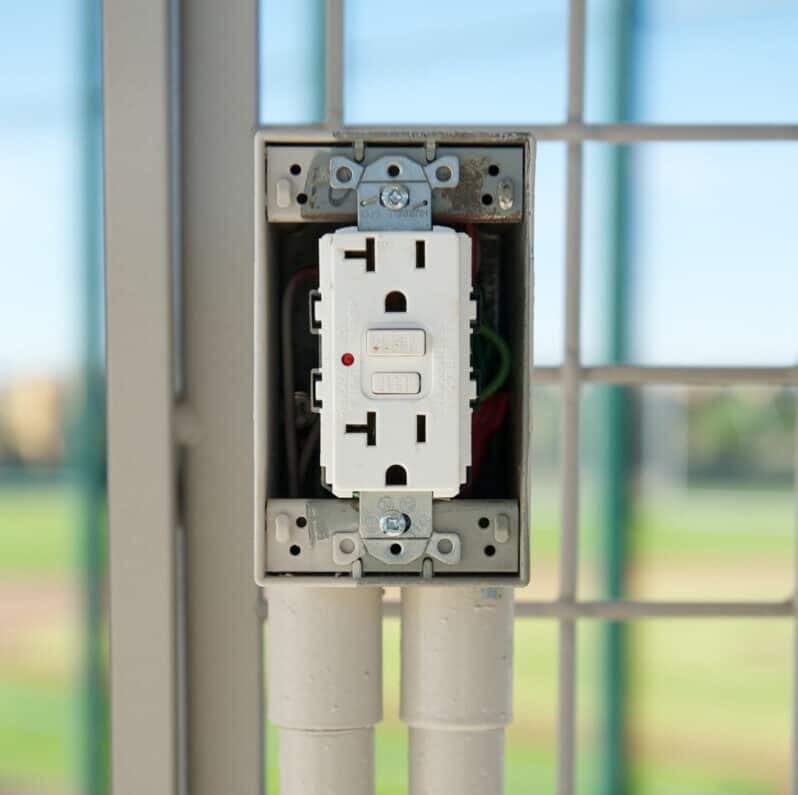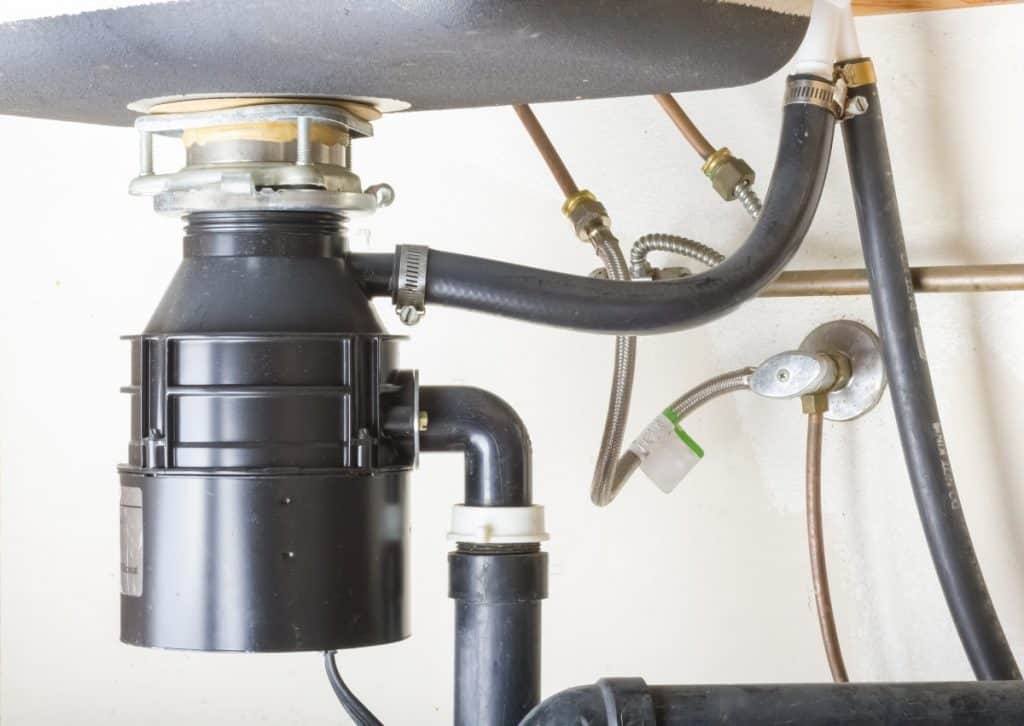Installing a garbage disposal can be complicated, but the end product is worth it. Whether you’re installing a new garbage disposal or maybe just replacing an old outlet, knowing whether or not garbage disposals need a GFCI is important.
Garbage disposals do not need to have GFCI’s according to the National Electric Code (NEC). Garbage disposals can be hard-wired or connected by an outlet. The NEC also says that all outlets within 6 feet of the sink need to have GFCIs. Having a GFCI can be helpful and still might be a smart idea.
While it is not required, having a GFCI installed for your garbage disposal is a good idea. Keep reading to learn more about GFCI’s and disposals.
What Is a GFCI Outlet?

GCFI outlets, also known as Ground Fault Circuit Interrupter outlets, are outlets that prevent electrical systems and appliances from overheating. They prevent fires and electrocution. (Source)
GFCI’s were invented in 1961 by Charles Dalziel, a professor of electrical engineering at the University of California. Since then, GFCI’s have been used to protect homes and businesses. (Source)
As you look at a typical electrical outlet, you will see three holes. The top left hole, the longer blade slot, is the neutral line. The right hole, a smaller blade slot, is the hotline. The electricity is circulated out through the hotline to the appliance you have plugged in. Then it goes back into the neutral line. This creates a circuit. When more electricity is going out of the circuit than is coming back in, problems can occur. GFCI’s notice this imbalance and trip, or turn off, the circuit.
When compared to other outlets, GFCI outlets look different because they contain their circuit breaker and have a reset button on them. Other outlets will not automatically turn off, and that can result in electric shock, fires, or the destruction of the electrical system.
Advantages of a GFCI Outlet
You might be asking, why should you consider using a GFCI if it isn’t required? Well, to save money later and protect yourself and your family.
GFCIs are made to protect people from electrical fires which can be caused by shorts or other wiring problems. GFCIs protect your appliances, keeping them safe from electric surges. Finally, they also help keep your family safe from electrical currents which can cause electrocution.
Fixing damages caused by electrical fires, electrical surges, or electrocutions can be expensive, but the GFCI outlet works to percent these damages from happening in the first place.
While we see from the NEC that it is not required to have a GFCI outlet for your garbage disposal, it can be a very good idea. If you think that the outlet might be exposed to water, then installing a GFCI outlet would be very useful. Because the outlet is so close to the sink, the outlet can be exposed to water from leaks or large spills. This is why installing a GFCI outlet is a good precaution.
When Is a GFCI Required?
It is required to have a GFCI outlet when the outlet is within 6 feet of the top rim of the sink. This doesn’t apply to outlets that are in cabinets or through walls.
This is a requirement because those outlets are more likely to be exposed to water because of their proximity to the sink. This is dangerous because water conducts electricity from the outlets and can easily lead to electrical shocks.
Different Configurations of Garbage Disposals
If you are trying to install or replace a garbage disposal, one important thing to know is which electrical configuration it has, whether is a hardwired configuration or a plug-in configuration. This will affect whether or not you can use a GFCI outlet.

Hardwired Configuration
Hardwired configuration appliances do not use an electrical outlet. Instead, their wiring is connected directly to the house’s electrical wiring. Because of this, there is no outlet, and consequently, you can’t use or add a GFCI outlet.
While not needing a GFCI for this configuration makes it a bit easier, the installation of this configuration is more complicated. Because you are interacting directly with the household wiring, this job is very complicated and easy to mess up. Electrical mess-ups can be very dangerous, resulting in fires or electrocution.
Unless you are experienced with electrical wiring and are confident you can hardwire it correctly, you will want to hire a professional to install a hardwired garbage disposal.
Plug-in Configuration
The second configuration of garbage disposals is a plug-in configuration. This is exactly what they sound like: garbage disposals that plug into an outlet. These are the garbage disposals that you can use a GFCI outlet with.
The outlet for the garbage disposal can be in the cabinet under the sink, or you can use a longer cord to reach an outlet further away from the sink.
Choosing a plug-in is also beneficial because if the outlet has enough capacity, you can also use it for the dishwasher or other close appliances. More than one appliance in a single outlet of power.
Other Restrictions and Tips
While knowing whether or not a GFCI outlet is required, it is also important to understand the other restrictions placed by the NEC (National Electric Code) when you are wiring in, installing, or replacing a garbage disposal.
- Connect the garbage disposal to a dedicated circuit, although sometimes a dishwasher can share the same circuit. However, they should only share a circuit if the owner manuals of both appliances allow it. (Source)
- Because the garbage disposal has parts that move quickly, it causes vibrations. These vibrations can separate electrical connections. Be sure that all the connections are secure. (Source)
- Make sure that the wiring and cords are in good condition. Cords with exposed or fraying wiring can cause fires or electrocution. Damaged cords should be replaced.
Conclusion
In the end, everyone wants to be safe and follow the law. GFCIs are not required for garbage disposals, but they are a good measure of protection. They help keep your house and family safe from harm. When done correctly, there is no harm in connecting your garbage disposal to a GFCI outlet.
Related Topics:
IIf you like the article above, here are some other similar articles you should check out!
What is GFCI and How Does it Work?
